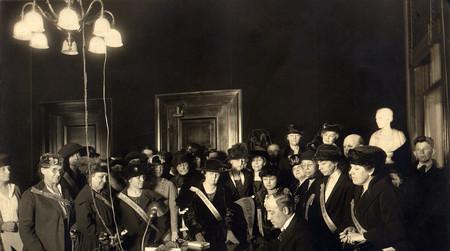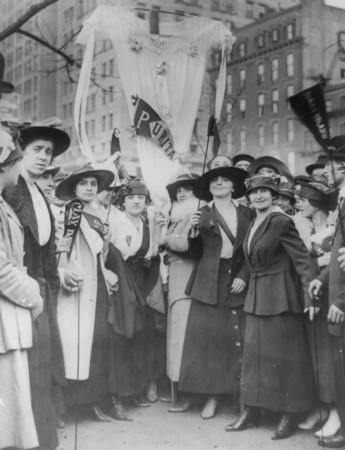Remembering Susan B. Anthony And Her Forgotten Allies

Last week marked the 197th birthday of suffragist, abolitionist, author and public speaker, Susan B. Anthony. Go to any cocktail party or trivia night at your local pub and Susan B. Anthony’s name is still most closely remembered and associated with the women’s suffrage movement.
Even though Susan B. Anthony passed away fifteen years prior to the ratification of the 19th Amendment in 1920, which granted women the right to vote, the amendment became coined as the ‘Susan B. Anthony Amendment’ in her honor.
Susan B. Anthony spoke in 1873: “It was we, the people; not we, the white male citizens; nor yet we, the male citizens; but we, the whole people, who formed the Union… And it is a downright mockery to talk to women of their enjoyment of the blessings of liberty while they are denied the use of the only means of securing them provided by this democratic-republican government – the ballot.”
A cutthroat activist, Susan B. Anthony caused uproar and controversy when she was arrested for illegally voting in the 1872 Presidential Election in Rochester, New York. She even refused to pay the fine of one hundred dollars for her ‘crime’ of voting. Can you imagine going to jail for casting your first vote? That takes guts.
Until her death in 1904, Susan B. Anthony worked tirelessly for the rights of women, giving countless speeches across the nation. In her later years, Susan ended up speaking over 100 times each year at conventions, rallies and marches in the U.S. She also petitioned at every congress from 1869 to the year she died in 1906 for the passage of the Women’s Suffrage Amendment.

Here are 10 of her most powerful quotes:
“The fact is, women are in chains, and their servitude is all the more debasing because they do not realize it.”
“There never will be complete equality until women themselves help to make laws and elect lawmakers.”
“The women, dissatisfied as they are with this form of government, that enforces taxation without representation — that compels them to obey laws to which they have never given their consent, — that imprisons and hangs them without a trial by a jury of their peers, that robs them in marriage, of the custody of their own persons, wages and children, — are this half of the people left wholly at the mercy of the other half, in direct violation of the spirit and letter of the declarations of the framers of this government, every one of which was based on the immutable principle of equal rights to all.”
“No self-respecting woman should wish or work for the success of a party who ignores her sex.”
“I never felt I could give up my life of freedom to become a man’s housekeeper. When I was young, if a girl married poor she became a housekeeper and a drudge. If she married wealthy, she became a pet and a doll.”
“Independence is happiness.”
“No man is good enough to govern any woman without her consent”
“There is not the woman born who desires to eat the bread of dependence, no matter whether it be from the hand of father, husband, or brother; for anyone who does so eat her bread places herself in the power of the person from whom she takes it.”
“Organize, agitate, educate, must be our war cry.”
“I declare to you that woman must not depend upon the protection of man, but must be taught to protect herself, and there I take my stand.”

According to historians, this passionate, strong-willed, inspirational activist and public speaker was once a humble Quaker girl wary of public speaking and self-conscious about her looks, similar to many women today. In light of the Women’s March on Washington following Trump’s Inauguration on January 20th, feminists and activists should do more than just remember Susan B. Anthony, but to learn from her.
Although Susan B. Anthony deserves to be remembered for her courageous work in helping gain women the right to vote, it’s disappointing that she is often one of the only names associated with the suffrage movement. Unlike history may have us believe, it’s misleading and false to assume that she is the only leader of the suffrage movement or one of the only leaders worth remembering.
Susan B. Anthony actually didn’t attend the famous Seneca Falls Convention held in New York in 1848 , also known as the first women’s rights convention. Elizabeth Cady Stanton, a powerful well-known suffragist political figure and writer at the time, organized the convention alongside Lucretia Mott.

Portrait of Sojourner Truth
Unfortunately, history also often overlooks black women suffragists who fought equally as brave their white-counterparts during the late nineteenth and early twentieth century. Black women weren’t always welcomed by white suffragists and were forced to participate in separate organizations.
Black women suffragists were pushed to the sidelines during that time period so names like Sojourner Truth, Mary Anne Shadd Cary, Mary Church Terrell and Ida B. Wells often don’t get the recognition they deserve. The suffragist movement during this period was not a Susan B. Anthony movement or a white-female movement, but a movement of all women, from all backgrounds and colors. And the same challenges that faced women a century ago still face us today.





